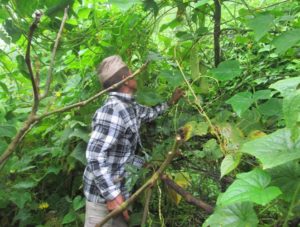According to the most recent survey, Nepal has a poverty level of 25.2%. The incidence of poverty in rural areas (27.2%) is almost double than that of urban areas (15.46%). According to government statistics, the agricultural sector contributes about 39% to the Gross Domestic Product. A large majority of households depend upon agriculture and allied activities such as livestock-rearing and forest product collection. Only about 21% out of the total area of the country is cultivable. About 80% of the indigenous populations are marginal landowners (<1 acre) or small cultivators (1-2 acres).
I grew up in a remote and impoverished region of the Himalaya in Nepal. I also received an education in hydro sciences and engineering in Germany. This background allows me to contribute to these figures and improve the future of Nepal.
I am always happy when listen the stories of the farmers I have helped through my work. Here is one such story. Mr. Kuber Praja has a wife and six children. Less than one acre of his four-acre landholding is registered farm land, and it is from this parcel of land that he makes a living. All of his children go to school, which makes generating enough income challenging. He practiced mono-cropping farming and this led to low production levels.
Luckily this changed after he participated in various Sustainable Integrated Farming Systems (SIFS) trainings, such as nursery management and seasonal/off-season vegetable production, and began vegetable farming. In one patch, he planted cauliflower and tomatoes and earned NRs 6000 (EUR 49) by selling them at the local market. He also earned NRs 7,000 (EUR 57) selling four season bean seed that he had planted as a result of the SIFS training. Mr. Praja can now feed his family and finance their needs. “Due to lack of knowledge I left land fallow, but that has changed,” he says. “I grow vegetables for home consumption and meet family expenses by selling different farm products.”
His success story also impacts his community. He trains other group members for improved farming and income generation. He recommends integrated farming to his neighbors and relatives, focusing on mixed vegetable farming in commercial blocks as a way to raise family incomes.
When people like Mr. Praja talk about their experiences, or when I hear someone like Ms. Saani Gurung say that the SIFS project has “changed her life” and showed her the “way out” of poverty, it always makes me smile. And I feel like I have made the right decision to come back and work in my home country.






